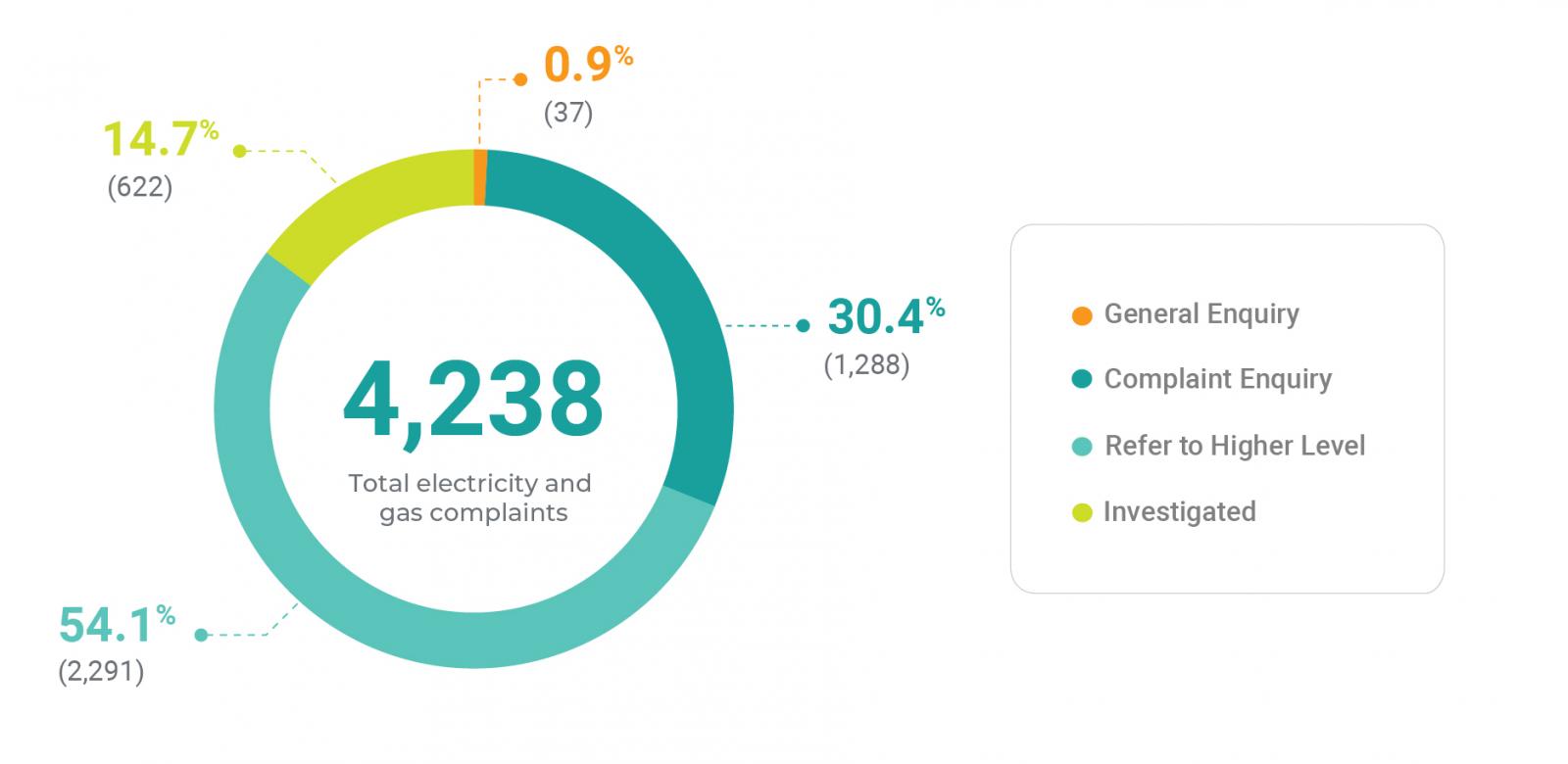-
Home
-
Publications and submissions
-
Reports
-
EWON Insights
-
EWON Insights Apr-Jun 2023
- Energy complaints and case studies
Energy complaints and case studies

Table 4 – Energy complaint breakdown, April to June 2023
|
Complaint type |
Number of complaints |
% total energy complaints |
|---|---|---|
|
General enquiry |
37 |
0.9% |
|
Complaint enquiry |
1,288 |
30.4% |
|
Refer to higher level |
2,291 |
54.1% |
|
Investigated |
622 |
14.7% |
|
Total |
4,238 |
100% |
Tariff assignment
When a new smart meter is installed at a property, the network distributor assigns a tariff to the property that is consistent with its current tariff structures. Tariffs have evolved to keep up with the changing electricity landscape and now include Time of Use tariffs and cost reflective demand-based tariffs.
A retailer does not have to pass through a tariff change, however it is in the best position to inform customers of tariff changes and offers available to them after a smart meter is installed.
More customers in the energy market are engaging with behind the meter products like solar, and having smart meters installed at their properties. Through Using customer complaints and case data, EWON has identified an increase in complaints from customers experiencing changes to their billing after a new meter is installed.
The most common issues raised are:
-
customers not advised that a tariff would change after a smart meter is installed
-
customers not provided with clear information about a tariff change or not being advised of what this will mean to their billing – including only being advised that a tariff ‘may’ change and not being provided with information about Time of Use tariffs or demand tariffs
-
confusion between tariffs being set by distributors and how retailers bill customers on market contract structures
-
some retailers billing on a tariff structure set by a distributor and others choosing to have different structures
-
customers not being advised of fees associated with tariff change requests.
The following case studies highlight some of the issues raised by customers.
 Billing system makes retailer transfer impossible
Billing system makes retailer transfer impossible
A customer had solar installed at his property in January 2023, and a smart meter was installed. His tariff was also changed to a residential single rate demand tariff.
He had an electricity account with Retailer A and had contacted Retailer B to request that his electricity account be transferred, however it advised that it could not accept the transfer as its billing system did not support the residential single rate demand tariff. It suggested to him that if he changed to a Time of Use tariff, he could then transfer to it.
The customer contacted Retailer A in April 2023 to request his tariff be changed to Time of Use, however, was told there would be a $180 fee. He disputed the fee as he was not told about it prior to the meter exchange. Retailer A said it had advised him of the fee when he was arranging for the smart meter to be installed. Retailer A offered to waive 50% of the tariff reconfiguration fee, however the customer asked for the whole fee to be waived and proof that the fee had been disclosed.
EWON referred the complaint to a specialist team at Retailer A, but the customer returned to EWON as he was not able to resolve the issue with the retailer.
 EWON contacted Retailer A to request additional information and it advised that the fee was passed on from the local distributor, however, in the interests of resolving the complaint, Retailer A offered to waive the fee to change the tariff.
EWON contacted Retailer A to request additional information and it advised that the fee was passed on from the local distributor, however, in the interests of resolving the complaint, Retailer A offered to waive the fee to change the tariff.
 Tariff change discovered during switch to new retailer
Tariff change discovered during switch to new retailer
A customer was contacted by his electricity retailer and offered a free meter upgrade. He was told that there would be no costs associated with the meter exchange and there wouldn’t be any changes to his tariff. He accepted the offer on this basis. He subsequently received a rate rise notification from his retailer and researched transferring to a different retailer.
He was advised by a prospective retailer that the tariff type had been changed on the national meter database from a single flat rate tariff to a single rate demand tariff. He considered that this was without his knowledge or informed consent. He contacted his electricity retailer and requested that the tariff be changed back to a single rate, however it declined and advised that he could not go back now that the meter had been changed.
Our review indicated it did not appear the customer was told of any change to his tariff before the meter was exchanged. Additionally, now the meter had been changed, it was not possible to go back to a single rate tariff as this was no longer offered for the meter type installed at the property.
 Our billing review showed the customer was being charged less under the new single rate demand tariff structure. The retailer offered to apply a $300 credit in recognition of poor customer service.
Our billing review showed the customer was being charged less under the new single rate demand tariff structure. The retailer offered to apply a $300 credit in recognition of poor customer service.
Customer Service
Customer service issues are more likely to be a contributing factor in a complaint to EWON, rather than the main driver of a complaint. Customers usually only approach EWON after multiple attempts to resolve an issue directly with their provider.
The first case study below demonstrates that customer service issues can exacerbate the other issues driving a complaint, such as contributing to the accrual of debt. The second example shows that customers may not initially have a customer service element to their enquiry or complaint, but then become unhappy when the retailer tries to answer their query or resolve the complaint. The third case study shows that while retailers are the main entities customers deal with, customers also value good service from network providers.
Although it is less common, customer service issues can sometimes be the main reason a customer complains to EWON. These cases demonstrate the importance customers place on convenience and availability in customer service.
 Customer service issues contribute to complaint about billing and affordability
Customer service issues contribute to complaint about billing and affordability
A customer had an electricity account balance of $11,000, with some quarterly bills reaching over $1,000. A community worker was acting as his advocate as he had a disability and was having difficulty paying his energy bills and other essentials. The advocate thought the bills seemed high as he was a single person living alone in a small social housing property with minimal appliances. The customer had started a payment arrangement of $200 per fortnight which he couldn’t afford. EWON referred the complaint to the retailer’s specialist resolution team to contact the advocate.
The advocate returned to EWON as the retailer had not contacted her.
The retailer said the issues contacting the advocate were because she was not authorised on the customer’s account. However, our review of the retailer’s contact records identified a call between the retailer and customer where the customer had tried to authorise the advocate. The retailer had incorrectly advised him that he must submit a written form. We found that a written form was only required if he wanted to add her as a secondary account holder. The retailer confirmed to EWON that verbal advice should have been sufficient.
Our review found that the customer had a smart meter and was billed on actual meter data. He had a consistent usage pattern with increased consumption in winter. He was receiving the correct government rebates.
We identified that the customer had been on the same pay on time discount offer for two years. The customer had paid consistently, but the amounts were irregular and he had not adhered to formal payment arrangements, so had missed all pay on time discounts. The retailer had spoken to the customer over the years but had not discussed more suitable offers. This was not in line with the retailer’s Hardship Policy or its obligations under the NSW Social Programs for Energy Code.
 To resolve the complaint, the retailer applied all missed pay on time discounts totaling $1,500, plus a customer service credit of $250. The retailer provided a dedicated case manager for the customer on its customer assistance program, with an initial arrangement of $55 per fortnight including up to $500 in payment matching. The retailer clarified which matters the advocate could deal with and which matters the customer would need to contact it directly about, such as providing consent for a new energy plan with a guaranteed discount instead of pay on time discount. The retailer and advocate also confirmed they would work with the customer to identify ways to help reduce usage and apply for Energy Accounts Payment Assistance.
To resolve the complaint, the retailer applied all missed pay on time discounts totaling $1,500, plus a customer service credit of $250. The retailer provided a dedicated case manager for the customer on its customer assistance program, with an initial arrangement of $55 per fortnight including up to $500 in payment matching. The retailer clarified which matters the advocate could deal with and which matters the customer would need to contact it directly about, such as providing consent for a new energy plan with a guaranteed discount instead of pay on time discount. The retailer and advocate also confirmed they would work with the customer to identify ways to help reduce usage and apply for Energy Accounts Payment Assistance.
 Poor service in response to billing complaint
Poor service in response to billing complaint
A customer received an electricity bill for November 2022 to February 2023 for $800, which she thought was high. She hadn’t used many appliances because part of the property was being renovated. She contacted her retailer and it accepted meter photos from her to adjust the bill. However, when she received the new bill, it had increased to over $3,000. She contacted the retailer again but the complaint was not resolved. The customer contacted EWON and we referred the complaint to the retailer's specialist resolution team.
The customer returned to EWON because she was unhappy with the progression of the complaint. Her case manager had asked her to send more meter photos and said she would investigate and provide detailed transaction information. The customer did not receive the promised information so she called repeatedly to speak to her case manager for an update but was told each time that the case manager was not available. When her case manager eventually called her back, the customer was told the bill was accurate. The customer challenged this, and her case manager then requested more meter photos, which the customer sent. Without receiving any further contact, she received a new electricity bill showing the account was now in credit. She could not contact her case manager by phone or email.
 EWON’s review found the reissued bill for $3,000 was based on the customer’s meter photo, but there was a typo transcribing the meter read onto the bill which significantly increased the usage. Following EWON’s referral, the account was rebilled to correct this, putting the account in credit by $275. Our review of this bill compared to the customer’s meter photos indicated the usage was in line. The customer said she was frustrated that the retailer did not provide a clear explanation when dealing with her directly. The retailer apologised for the customer service issues. The customer was primarily being billed on actual reads, but the retailer offered to install a smart meter to ensure actual reads and give the customer more visibility over her usage.
EWON’s review found the reissued bill for $3,000 was based on the customer’s meter photo, but there was a typo transcribing the meter read onto the bill which significantly increased the usage. Following EWON’s referral, the account was rebilled to correct this, putting the account in credit by $275. Our review of this bill compared to the customer’s meter photos indicated the usage was in line. The customer said she was frustrated that the retailer did not provide a clear explanation when dealing with her directly. The retailer apologised for the customer service issues. The customer was primarily being billed on actual reads, but the retailer offered to install a smart meter to ensure actual reads and give the customer more visibility over her usage.
 Customer unhappy with network provider service
Customer unhappy with network provider service
A customer had reported a non-functioning streetlight to the network provider in his area in 2020, and again numerous times in 2021 and 2022. The globe in the streetlight was eventually replaced but this didn’t fix the problem. In late 2022, he was advised that the light pole needed replacing and this would take place in early 2023. The network provider replaced other poles on the street, but not the light pole he had complained about. He was then notified the light pole would be replaced by the end of March 2023, but this didn’t occur. EWON referred the complaint to a specialist resolution team at the provider to contact the customer.
The customer returned to EWON as he had been advised that the replacement would occur before the end of April 2023. However, just before the end of the month he received an email indicating it would now be at least another month. He was frustrated with the repeatedly changing advice and the lack of progress.
 The network provider acknowledged the customer’s frustration and explained that the lights were not standard and not in their usual scope to repair. The delays were caused by needing to liaise with the local council, obtain specialist parts and find staff resourcing to complete the repairs. There were also life support customers in the area which impacted arrangements. The network provider confirmed works were now scheduled for a specific date in late May 2023, subject to emergency network requirements or weather. The customer advised the complaint was resolved on this basis and has not returned to indicate the issue is still ongoing.
The network provider acknowledged the customer’s frustration and explained that the lights were not standard and not in their usual scope to repair. The delays were caused by needing to liaise with the local council, obtain specialist parts and find staff resourcing to complete the repairs. There were also life support customers in the area which impacted arrangements. The network provider confirmed works were now scheduled for a specific date in late May 2023, subject to emergency network requirements or weather. The customer advised the complaint was resolved on this basis and has not returned to indicate the issue is still ongoing.

